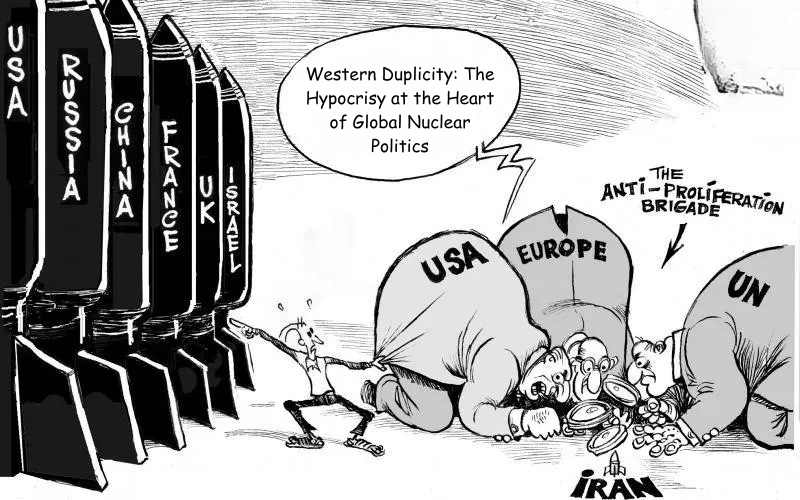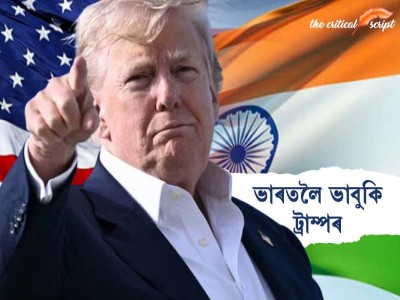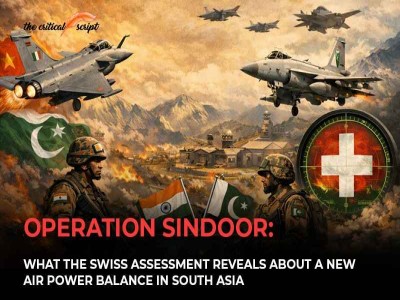
The Price of Deterrence: How the Nuclear Umbrella Shields Some and Exposes Others
In the unforgiving arena of international geopolitics, the possession or credible pursuit of nuclear weapons has emerged as the ultimate insurance policy for regimes facing Western hostility. The cases of Pakistan and North Korea on one side, and Libya and Iran on the other, offer a striking contrast that raises uncomfortable questions about the strategic logic, double standards, and long-term consequences of nuclear deterrence.
The Doctrine of Deterrence: A Modern Shield
The cornerstone of modern nuclear strategy lies in deterrence - the belief that nuclear weapons are not primarily meant to be used, but to prevent their very use by others.
This logic has given rise to a global status quo where countries with nuclear weapons, or those under the "nuclear umbrella" of allied powers like the U.S. or Russia, are effectively insulated from full-scale foreign intervention.
Pakistan, despite being politically unstable, harboring terrorist networks, and engaging in border skirmishes, has never faced a NATO-style intervention. Its nuclear
capability is seen as a red line.
North Korea, economically isolated and diplomatically estranged, has conducted multiple nuclear tests, threatened regional allies, and violated UN resolutions, yet
remains untouchable. Its nuclear arsenal, however rudimentary, makes any direct military action by the U.S. or its allies dangerously unpredictable.
The Libya Paradox: Disarmament as a Death Sentence
In 2003, Muammar Gaddafi’s Libya voluntarily abandoned its nuclear weapons program and handed over equipment and documentation to Western powers in a landmark act of disarmament. In return, Libya hoped for reintegration into the global community.
But in 2011, amid a
civil uprising, NATO intervened militarily under the guise of protecting
civilians. The intervention swiftly turned into a regime change. Gaddafi was
captured and killed, and the country plunged into chaos, a failed state with
multiple factions and open slave markets.
To many strategic
thinkers, particularly in Iran and North Korea, Libya became a cautionary tale.
The implicit message was: disarmament leads not to security, but to
vulnerability and regime collapse.
Iran: Suspicion
Without Deterrence
Unlike North Korea
and Pakistan, Iran remained a signatory to the Non-Proliferation Treaty (NPT)
and repeatedly asserted that its nuclear program was peaceful. This culminated
in the landmark 2015 Joint Comprehensive Plan of Action (JCPOA), through which
Iran agreed to stringent limits and inspections in exchange for sanctions
relief.
However, despite full
compliance, as verified by the International Atomic Energy Agency (IAEA), Iran
received no lasting reprieve. In 2018, the United States, under President
Trump, unilaterally exited the JCPOA and reimposed sweeping sanctions. The move
not only undermined years of diplomacy but sent a clear message: cooperation,
even when verified, would not shield Iran from economic warfare or political
isolation.
This posture of
compliance without strategic deterrence has emboldened Iran’s adversaries.
Israel, with tacit or open U.S. support, escalated covert sabotage operations -
cyberattacks, assassinations of nuclear scientists like Mohsen Fakhrizadeh, and
targeted airstrikes on Iranian-linked forces in Syria and Lebanon. The 2020
U.S. drone strike that killed Qassem Soleimani, a top Iranian commander, was a
turning point, an overt act of aggression on foreign soil, carried out without
direct military consequences.
In 2025, the dynamics
worsened. As the Israel-Gaza war intensified, Iran found itself drawn deeper
into the conflict. Though it denied direct involvement in Hamas’s attacks,
Iran’s broader "Axis of Resistance," including Hezbollah in Lebanon,
Shiite militias in Iraq, and the Houthis in Yemen, has come under direct
Israeli and U.S. fire. Several IRGC commanders have been killed in Syria and
Iraq, and Israeli strikes have targeted Iranian military advisers. In response,
Iran retaliated with missile and drone strikes, but still within limits
carefully calibrated to avoid a full-scale war.
In a major escalation
of the ongoing Israel–Iran war, the United States launched coordinated
airstrikes targeting three Iranian nuclear sites of Fordow, Natanz, and Isfahan
on June 22, 2025, under Operation Midnight Hammer.
Despite this
escalating war, the broader international community has shown little appetite
to restrain U.S. or Israeli actions against Iran. Iran’s restraint, once seen
as diplomacy, is now interpreted as weakness, while its lack of a nuclear
arsenal makes it an easier target for kinetic operations.
In stark contrast,
nuclear-armed North Korea, despite its provocations, is largely left alone,
precisely because of the existential risk its deterrent presents.
Thus, Iran’s legal
and diplomatic path has resulted not in security, but in increased vulnerability,
reinforcing a troubling global trend: that compliance with non-proliferation
norms, absent nuclear deterrence, offers no real protection against
geopolitical aggression.
Selective Morality
and Strategic Hypocrisy
The global nuclear
order, while formally governed by the NPT and international institutions, often
operates on selective enforcement. Meanwhile, non-nuclear states like Iran,
Iraq, Syria, Libya, and now Gaza have faced overwhelming military force with
far fewer restraints.
This double standard
leads many critics to argue that nuclear weapons, rather than being instruments
of destruction, have become tools of geopolitical legitimacy. Those who have
them are courted; those who don’t are coerced.
The Dangerous
Incentive Structure
The strategic
incentives created by this imbalance are troubling:
● Autocratic regimes
learn that pursuing nuclear weapons may ensure survival.
● Disarmament becomes
politically toxic, viewed as naïve or suicidal.
● Global
non-proliferation efforts weaken, as more countries begin to question whether
they, too, need a deterrent.
In effect, the
current system punishes cooperation and rewards defiance, so long as that
defiance is backed by uranium enrichment and missile tests.
Between Power and
Peace
The nuclear umbrella,
in its current form, is a paradox. It has prevented great-power wars for
decades, but it has also entrenched a world of strategic inequality. Nations
like Pakistan and North Korea are protected not because they are responsible
actors, but because they can retaliate catastrophically. Those without this
shield, even when they comply with global norms, remain vulnerable to external
pressure, regime change, and economic strangulation.
If the global
community is serious about peace and equity, it must rethink the incentives of
the nuclear order. As long as nuclear weapons remain the ultimate guarantor of
sovereignty, disarmament will remain a dream, and proliferation a reality.
Disclaimer: The opinions expressed in this article are those of the author's. They do not purport to reflect the opinions or views of The Critical Script or its editor.

Newsletter!!!
Subscribe to our weekly Newsletter and stay tuned.

















Related Comments